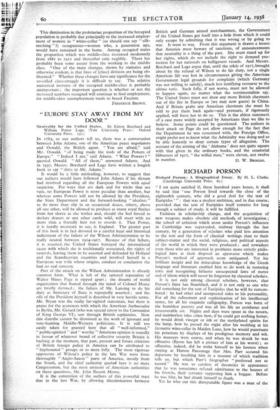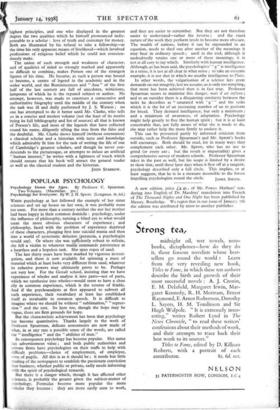RICHARD PORSON
Richard Porson : A Biographical Essay. By M. L. Clarke. (Cambridge University Press. 6s.) " I AM quite satisfied if, three hundred years hence, it shall be said that ' one Porson lived towards the close of the eighteenth century, who did a good deal for the text of Euripides ' " : that was a modest ambition, and in due course, provided that the text of Euripides itself remains for long enough a subject of study, it will be fulfilled.
Fashions in scholarship change, and the acquisition of new weapons makes obsolete old methods. of investigation ; the school of criticism which arose under Porson's influence in Cambridge was superseded, midway through the last century, by a generation of scholars who paid less attention to the text and the form of classical writings than to their subject-matter and the social, religious, and political aspects of the world in which they were produced ; and nowadays even those who are interested in problems more strictly philo- logical have at their disposal an apparatus which makes Porson's method of approach seem antiquated. Yet his brilliant insight and his miraculous knowledge of the Greek language and literature enabled him to do work in restoring texts and recognising hitherto unsuspected laws of metre and of idiom which will never be forgotten by classical scholars.
It is not only among classical scholars, hoviever, that Porson's fame has flourished, and it is not only as one who did something for the text of Euripides that he will be remem- bered : he had other and unexpected sides to his personality. For all the refinement and sophistication of his intellectual tastes, for all his exquisite calligraphy, Porson was born of the humblest parents and was all his life an assiduous and irrecoverable sot. Nights and days were spent in the tavern, and numberless tales relate how, if he could get nothing better, he would drink vinegar or ink or the methylated spirits for the lamp, how he passed the night after his wedding at his favourite wine-cellar in Maiden Lane, how he would punctuate his potations by displays of his prodigious memory and wit. His manners were coarse, and when he was drunk he was offensive (Byron has left a picture of him at his worst) ; so offensive, indeed, did he make himself to his hostess when staying at Hatton Parsonage that Mrs. Parr secured his departure by insulting him in a manner of which tradition tells us, but which Parr's biographer " preferred not to record." He was so careless of decencies in' appearance that he was sometimes refused admittance to the houses of his friends, their servants supposing him a beggar. Before he was fifty, he had drunk himself to death.
Yet he who cut this disreputable figure was a man of the highest principles, and one who displayed in the greatest degree the two qualities which he himself pronounced indis- pensable to a scholar : love of truth and contempt for money. Both are illustrated by his refusal to take a fellowship—at the time his only apparent means of livelihood—which involved professions of religious belief which he could not conscien- tiously make.
The union of such strength and weakness of character, and of qualities of mind so strongly marked and apparently so difficult to combine, makes Porson one of the strangest figures of his time. He became, as such a person was bound to become, a centre of legend in the academic and in the wider world, and the Reminiscences and " Ana " of the first half of the last century are full of anecdotes, witticisms, lampoons of which he is the reputed subject or author. No attempt, however, was made to construct a consecutive and authoritative biography until the middle of the century when the task was ill and dully performed by J. S. Watson ; no one has attempted to do it better until Mr. Clarke, who tells us in a concise and modest volume (not the least of its merits being its full bibliography and list of sources) all that is known of Porson's life, and most of the legends that have collected round his name, diligently sifting the true from the false and the doubtful. Mr. Clarke shows himself (without ostentation) a classical scholar and a historian with taste and knowledge which admirably fit him for the task of writing the life of one of Cambridge's greatest scholars, and though he never con- descends to the picturesque, or attempts to infuse an artificial " human interest," he writes with a lightness of touch which should ensure that his book will attract the general reader as well as the classical student and the historian.
JOHN SPARROW.







































 Previous page
Previous page